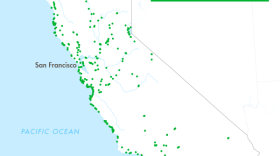
WHITEWATER (CNS) - A bipartisan conservation bill signed Tuesday by President Donald Trump, which safeguards around 375,500 acres of public land and designates 77 miles of waterways as wild and scenic rivers in southeastern California, will expand Joshua Tree and Death Valley national parks and give permanent protection to the Whitewater River in Riverside County.
Congress last month overwhelmingly approved the California Desert Protection and Recreation Act of 2019, which was championed by Sen. Dianne
Feinstein, D-Calif., and several congressional representatives, including Rep. Paul Cook, R-Apple Valley. It was part of a package of public lands bills --
the John D. Dingell Jr. Conservation, Management and Recreation Act -- which the president signed into law.
The legislation builds upon the legacy of Feinstein's landmark 1994 California Desert Protection Act, which established Joshua Tree and Death
Valley national parks, the Mojave National Preserve and protected more than 7.6
million acres of California desert wilderness.
``The California Desert Protection and Recreation Act is the
culmination of more than two decades of work. I consider it a fulfillment of
promises I made when I took office, and I'm proud to finally see this process
come to fruition,'' Feinstein said.
Geary Hund, executive director of the Mojave Desert Land Trust, called
the legislation ``a huge win for conservation.''
``It ensures that some of the most important natural and cultural
resources in the Mojave Desert will be protected and connected in perpetuity.
It contributes to the creation of an interconnected system of reserves
including Joshua Tree National Park, the Mojave Trails National Monument and
the Mojave National Preserve. These areas are critically important to
maintaining the health of desert ecosystems and more specifically, they are
important to iconic desert species such as desert tortoise and bighorn sheep.''
Joshua Tree National Park will be expanded by 4,518 acres and Death
Valley National Park by 35,292 acres, which includes 1,600 acres donated by the
Mojave Desert Land Trust, according to Feinstein's office, which said the
legislation also expands Death Valley National Park Wilderness by 88,000 acres
and adds 7,141 acres to the San Gorgonio Wilderness within the San Bernardino
National Forest.
The bill also establishes the 81,800-acre Vinagre Wash Special
Management Area in Imperial County to protect ecologically sensitive areas and
Native American heritage sites, designates the 18,840-acre Alabama Hills
National Scenic Area in Inyo County for continued recreational use, and
protects 28.1 miles of the Whitewater River, which means that a dam cannot be
installed on the waterway, according to the California Wilderness Coalition.
The nonprofit organization, also known as CalWild, worked for years in
support of the measure, which ``not only protects sensitive desert water
resources, fragile wildlife habitat and spectacular scenic vistas, but also
bolsters tourism which is essential to the economies of desert cities by
ensuring public lands remain in their natural state.''
Kelly Crawford of Joshua Tree Excursions, which provides group tours
in Joshua Tree National Park and nearby public lands, hailed the signing of the
bill.
``The public lands of the California desert draw visitors from around
the world, who come to enjoy the area's wildlife, scenic vistas, and recreation
opportunities,'' Crawford said. ``This has created a thriving tourism economy
that seems to grow every year as more people discover the desert as a
destination. The California Desert Protection and Recreation Act secures this
important legacy for residents, businesses, and visitors.''
Joshua Tree is home to the desert tortoise, which was placed on both
the California and Federal Endangered Species Lists in 1989 and 1990,
respectively. Between 200 and 200 bighorn sheep live in Joshua Tree and survive
on a variety of desert plants, including cacti.
The Whitewater River also hosts bighorn sheep, as well as a few
federally endangered species, according to The Wildlands Conservancy.
Endangered species include two birds -- the Southwest willow flycatcher and
Bell's vireo.
``Some of the bill's conservation measures were years in the making,''
according to a statement released by CalWild. ``Local conservationists
first asked the Forest Service to study Deep Creek and the Whitewater River --
two streams that flow from the San Bernardino Mountains into the Mojave and
Coachella Valley -- more than 30 years ago.''
According to Feinstein's office and Ryan Henson, CalWild's senior
policy director, the legislation's support was wide-ranging and included
conservationists, tribes, the U.S. military, local governments, public
utilities, small businesses, off-road enthusiasts, cattle ranchers and mining
interests.
Brian Sybert, executive director of the Durango, Colorado-based
Conservation Lands Foundation, said ``efforts of grassroots groups across the
West -- powered by volunteers who want to protect the quality of life in their
own communities -- have resulted in one of the most significant conservation
laws to be enacted in decades.''
``Because of this law, more children will be introduced to the
outdoors, wildlife will benefit from intact migration corridors, and the
histories and cultures encompassed within these lands will endure for future
generations of Americans,'' he said.
No additional resources were provided to the protected lands within
the conservation bill, CalWild Assistant Policy Director Linda Castro said. She
added that it may take a while for local agencies to change signage at the
newly minted protected lands.









